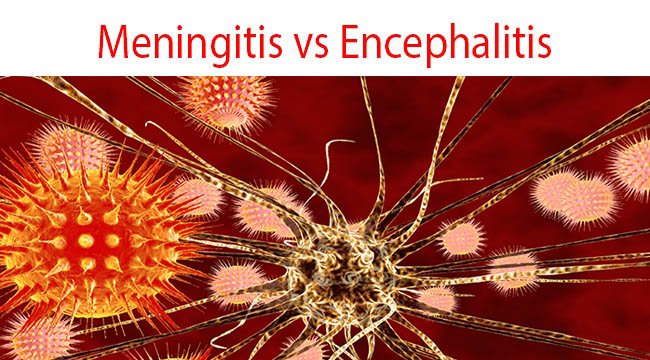Meningitis and encephalitis may be the most terrifying diseases in medicine. Bacterial meningitis and viral encephalitis may be rapidly fatal, even in healthy persons. Survivors may suffer lasting neurological sequelae, including memory loss and seizures. Viral meningitis, by contrast, gives patients a bad headache and a stiff neck, but uneventful recovery is the rule.
Some of the differences between Meningitis and Encephalitis are as follows:
| S.N. | Characteristics | Meningitis | Encephalitis |
|---|---|---|---|
| 1 | Definition | Meningitis is an inflammation of the three membranes that cover the brain and spinal cord (the meninges). | Encephalitis is an acute inflammation of the brain (Brain Parenchyma). |
| 2 | Causative Agent | Bacteria, Viruses and Fungi | Mostly Viruses |
| 3 | Common Causes | Streptococcus pneumoniae and Neisseria meningitides are the most common causes of meningitis in adults. | Herpes simplex virus-1 (HSV-1) and Japanese Encephalitis are the most important causes of encephalitis in adults. |
| 4 | Forms | Meningitis can be only one form. | Encephalitis can be divided into two forms, primary and secondary encephalitis. Primary encephalitis occurs when a virus directly invades the brain and spinal cord. Secondary, or post-infectious encephalitis occurs when a virus first infects another organ and secondarily enters the brain. |
| 5 | Symptoms | Headache, fever, confusion, drowsiness, and fatigue. Also seizures or convulsions, tremors, hallucinations, and memory problems. | Headache and neck stiffness associated with fever, confusion or altered consciousness, vomiting, and an inability to tolerate light (photophobia) or loud noises (phonophobia). |
| 6 | Diagnosis | Physical examination,
followed by CBC with differential, C-reactive protein, and blood for Gram stain and culture. | Clinical presentation and supported by spinal fluid analysis and neuroimaging abnormalities, CSF PCR. |
| 7 | Rash | Skin discoloration or rash may be present | Absent |
| 8 | Altered Mental Status | No focal deficits or AMS | Altered Mental Status |
| 9 | Treatment | Ampicillin is usually prescribed along with an aminoglycoside or a cephalosporin (cefotaxime) medication. | Acyclovir, and is usually administered intravenously in the hospital for at least ten days. |
Similar Posts:
- Techniques of Virus Cultivation
- Cryptococcus Neoformans – Habitat, Morphology, Epidemiology, Virulence Factors, Treatment + More
- Zika Virus- Structure, Genome, Symptoms, Transmission, Pathogenesis, Diagnosis
- Hepatitis B Virus- Structure, Epidemiology, Symptoms, Pathogenesis, Diagnosis, Treatment and Vaccines


I had viral encephalitis herpes simplex1. At age 42 was given acyclovir.
Major residual is a jaw tremor, some spacial issues and exhaustion when around people too much, pressure in head from music.
Mine was right frontal lobe damage which regulates emotions
Don’t forget that encephalitis can be caused by autoimmune responses.
My daughter was diagnosed with acute necrotizing encephamyelitis could u give me any info on this
I think the symptoms section is wrong, that’s the other way around. Headache neck stiffness phono/photphobia & vomiting occur more frequently in meningitidis. Good article tough
HI! there is a mistake in the symptoms. neck stiffness is found in meningitis, not encephalitis 🙂
what about streptococcus group B
E.COLI,Mycobacterium tuberculosis T.B,
cryptococcus newformans ,H.Infunzia
according to who csf sample can be done for meningitid too